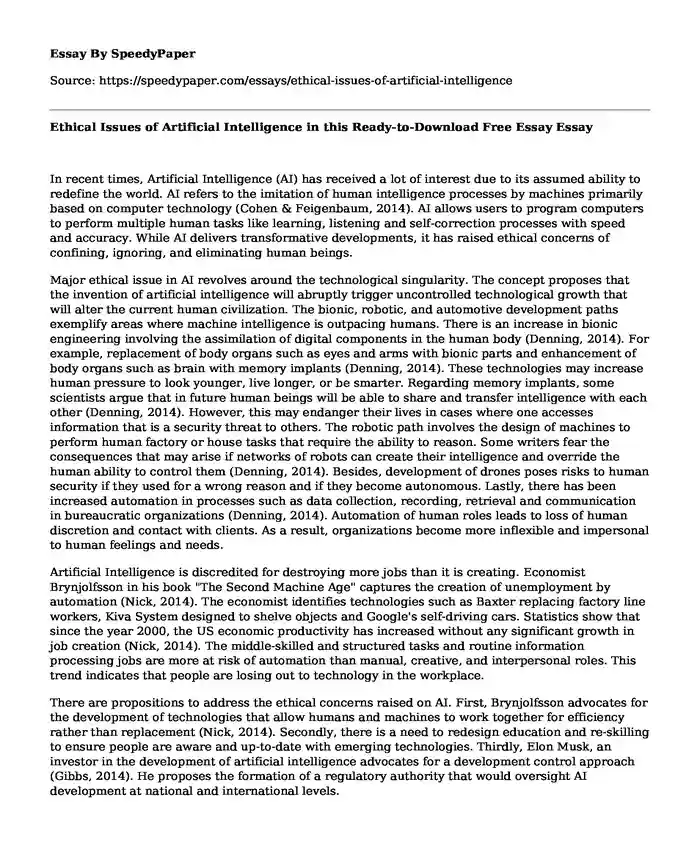
| Type of paper: | Essay |
| Categories: | Ethics Artificial intelligence |
| Pages: | 3 |
| Wordcount: | 695 words |
In recent times, Artificial Intelligence (AI) has received a lot of interest due to its assumed ability to redefine the world. AI refers to the imitation of human intelligence processes by machines primarily based on computer technology (Cohen & Feigenbaum, 2014). AI allows users to program computers to perform multiple human tasks like learning, listening and self-correction processes with speed and accuracy. While AI delivers transformative developments, it has raised ethical concerns of confining, ignoring, and eliminating human beings.
Major ethical issue in AI revolves around the technological singularity. The concept proposes that the invention of artificial intelligence will abruptly trigger uncontrolled technological growth that will alter the current human civilization. The bionic, robotic, and automotive development paths exemplify areas where machine intelligence is outpacing humans. There is an increase in bionic engineering involving the assimilation of digital components in the human body (Denning, 2014). For example, replacement of body organs such as eyes and arms with bionic parts and enhancement of body organs such as brain with memory implants (Denning, 2014). These technologies may increase human pressure to look younger, live longer, or be smarter. Regarding memory implants, some scientists argue that in future human beings will be able to share and transfer intelligence with each other (Denning, 2014). However, this may endanger their lives in cases where one accesses information that is a security threat to others. The robotic path involves the design of machines to perform human factory or house tasks that require the ability to reason. Some writers fear the consequences that may arise if networks of robots can create their intelligence and override the human ability to control them (Denning, 2014). Besides, development of drones poses risks to human security if they used for a wrong reason and if they become autonomous. Lastly, there has been increased automation in processes such as data collection, recording, retrieval and communication in bureaucratic organizations (Denning, 2014). Automation of human roles leads to loss of human discretion and contact with clients. As a result, organizations become more inflexible and impersonal to human feelings and needs.
Artificial Intelligence is discredited for destroying more jobs than it is creating. Economist Brynjolfsson in his book "The Second Machine Age" captures the creation of unemployment by automation (Nick, 2014). The economist identifies technologies such as Baxter replacing factory line workers, Kiva System designed to shelve objects and Google's self-driving cars. Statistics show that since the year 2000, the US economic productivity has increased without any significant growth in job creation (Nick, 2014). The middle-skilled and structured tasks and routine information processing jobs are more at risk of automation than manual, creative, and interpersonal roles. This trend indicates that people are losing out to technology in the workplace.
There are propositions to address the ethical concerns raised on AI. First, Brynjolfsson advocates for the development of technologies that allow humans and machines to work together for efficiency rather than replacement (Nick, 2014). Secondly, there is a need to redesign education and re-skilling to ensure people are aware and up-to-date with emerging technologies. Thirdly, Elon Musk, an investor in the development of artificial intelligence advocates for a development control approach (Gibbs, 2014). He proposes the formation of a regulatory authority that would oversight AI development at national and international levels.
Definitely, artificial intelligence improves speed, output, and accuracy of human processes. However, technologies such as bionic engineering, robotics, and automation pose fears to the human race. The risks include loss of human freedoms, discretion, personal connections, and jobs. In the future, humanity must continuously develop technology that compliments human capacities, enhance human technological skills, and provide oversight of the AI development process.
References
Cohen, P. R., & Feigenbaum, E. A. (Eds.). (2014). The handbook of artificial intelligence (Vol. 3). Butterworth-Heinemann.
Gibbs, Samuel. (October 2014). Elon Musk: Artificial intelligence is our biggest existential threat. The Guardian. Retrieved from https://www.theguardian.com/technology/2014/oct/27/elon-musk-artificial-intelligence-ai-biggest-existential-threat. Accessed on 17th March 2018.
Denning, Peter. (2014). Ubiquity symposium: The technological singularity: what about an unintelligent singularity?. Ubiquity. Retrieved from https://ubiquity.acm.org/article.cfm?id=2668388 Accessed on 17th March 2018.
Nick, Heath. (2014). Why AI could destroy more jobs than it creates, and how to save them. TechRepublic. Retrieved from https://www.techrepublic.com/article/ai-is-destroying-more-jobs-than-it-creates-what-it-means-and-how-we-can-stop-it/.Accessed on 17th March 2018.
Cite this page
Ethical Issues of Artificial Intelligence in this Ready-to-Download Free Essay. (2022, Feb 14). Retrieved from https://speedypaper.net/essays/ethical-issues-of-artificial-intelligence
Request Removal
If you are the original author of this essay and no longer wish to have it published on the SpeedyPaper website, please click below to request its removal:
- SWOT Analysis of Booz Allen Hamilton Incorporation - Free Essay
- Engaged Listening in the Music Essay Sample
- Essay Sample: Education from Different Points of View
- Free Essay in Management: Organizational Behavior and Development
- Free Paper Sample: Land Administration Systems Report Review
- Essay Sample on Tragedy and Art
- Essay Example on Well Completion Report Summary
Popular categories




